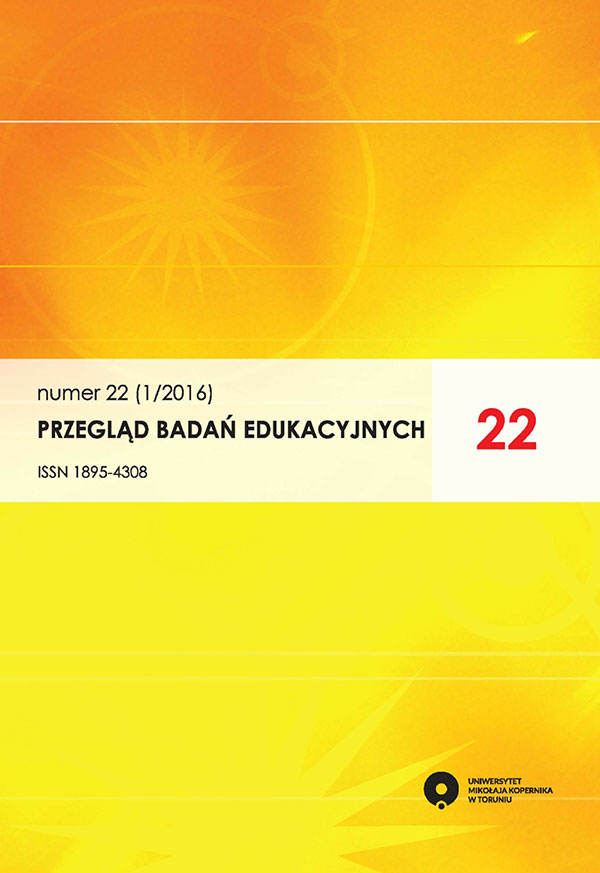Agency and Communion in the Situation of Activation of the Gender Stereotype
DOI:
https://doi.org/10.12775/PBE.2015.061Keywords
Agentic orientation, communal orientation, unmitigated agency, unmitigated communion, gender stereotypesAbstract
Agency and communion are two basic dimensions of social perception. The aim of the two conducted studies was to determine whether activation of the gender autostereotype or heterostereotype affect the perception of each other in the above mentioned dimensions. The research was conducted in a quantitative strategy. The intensity of agency and communality was measured using Kwestionariusz Samoopisu 30 and Kwestionariusz Opinii o Sobie 22 (Wojciszke, 2010). The stereotype of gender was activated by the lists of jobs stereotypically considered as feminine, masculine or neutral. 60 people, 30 women and 30 men who are studying humanities or science took part in the experiment. The research showed that the field of studies and stereotype activation does not have a significant effect on the perception of the dimension of community, but it can affect the perception in the dimension of agency. The students of science scored higher on the unmitigated agency scale. The gender of subjects in the examination turned out to be significant. The women were perceived in the dimension of community, and the men of agency.References
Abele A., Wojciszke B. (2007), Agency and communion from the perspective of self versus others, “Journal of Personality and Social Psychology”, 93, s. 751–763.
Bakan D. (1966), The duality of human existence, Addison-Wesley, Reading, PA.
Bem S. L. (1974), The measurement of psychological androgyny, „Journal of Consulting and Clinical Psychology”, 42, s. 155–162.
Brown R. (1965), Social Psychology, Free Press, New York.
Conway M., Pizzamiglio M. T., Mount L. (1996), Status, communality, and agency: Implication for stereotypes of gender and other groups, “Journal of Personality and Social Psychology”, 71, s. 25–38.
Eagly A. H., Carli L. L. (1981), Sex of researches and sex-typed communications as determinants of sex differences in influenceability: A meta-analysis of social influence studies, “Psychological Bulletin”, 90, s. 1–90.
Eagly A. H., Kite M. E. (1987), Are stereotypes of nationalities applied to both women and men?, “Journal of Personality and Social Psychology”, 53, s. 451–462.
Eagly A. H., Steffen V. J. (1984), Gender stereotypes stem from the distribution of woman and men into social roles, “Journal of Personality and Social Psychology”, 46, s. 735–754.
Fiske S. T., Cuddy A. J., Glick P. (2007), Universal dimensions of social cognition: Warmth and competence, “Trends in Cognitive Science”, 11, s. 77–83.
Fiske S. T., Xu J., Cuddy A. J., Glick P. (1999), (Dis)respecting versus (dis)liking: Status and interdependence predict ambivalent stereotypes of competence and warmth, “Journal of Social Issues”, 55, s. 473–491.
Helgeson V. S. (2003), Gender related traits and health, w: J. M. Suls, K. A. Walston (eds.), Social psychological foundations of health and illness, Blackwell Publishing, Oxford, s. 367–394.
Judd C., James-Hawkins L., Yzerbyt V., Kashima Y. (2005), Fundamental dimensions of social judgment: Understanding the relations between judgments of competence and warmth, “Journal of Personality and Social Psychology”, 89, s. 899–913.
Lippmann W. (1922), Public opinion, New York: Harcourt Brace.
Manstead A., Hewstone M. (1996), Encyklopedia Blackwella, Jacek Santorski, Warszawa, s. 350–356.
Miluska J., Boski P. (1999), Męskość-kobiecość w perspektywie indywidualnej i kulturowej, Instytut Psychologii PAN, Warszawa, s. 9–34.
Money J. (1973), Prenatal hormones and postnatal socialization in gender identity differentiation, w: J. Cole, R. Dienstbier (eds.), Nebraska Symposium on Motaivation 1973, University of Nebraska Press, Lincoln.
Pine F. (1996), Gender. W: A. Barnard, J. Spencer, Encyclopedia of Social and Cultural Anthropology, Routledge, London, s. 253.
Reinhard M. A., Stahlberg D., Messner M. (2009), When failing feels good: Relative prototypicality for a high-status group can counteract ego-threat after individual failure, “Journal of Experimental Social Psychology”, 45, s. 788–795.
Rubacha K. (2011), Metodologia badań nad edukacją, Oficyna Wydawnicza Łośgraf, Warszawa: s. 344–355.
Sekuła-Kwaśniewicz H. (2000), Płeć, w: H. Domański, W. Morawski i J. Mucha, Encyklopedia socjologii, t. 3 (O–R), Wydawnictwo Nukowe PWN, Warszawa, s. 123.
Spence J. T., Helmreich R. L. (1980), Masculinity and femininity, University of Texas Press, Austin, TX.
Unger R. K., Crawford M. (1993), Commentary: Sex and gender-the troubled relationship between terms and concepts, “Psychological Science”, 4, s. 122–124.
Vinacke W. E. (1957), Stereotypes as social concepts, “The Journal of Social Psychology”, 46, s. 229–243.
Wojciszke B. (2005), Morality and competence in person and self perception, “European Review of Social Psychology”, 16, s. 155–188.
Wojciszke B. (2010), Wspólnotowość i sprawczość. Podstawowe wymiary spostrzegania społecznego, Gdańskie Wydawnictwo Psychologiczne, Gdańsk, s. 193–259.
Znaniecki F. (1984), Społeczne role uczonych, PWN, Warszawa.
Downloads
Published
How to Cite
Issue
Section
Stats
Number of views and downloads: 6060
Number of citations: 0



